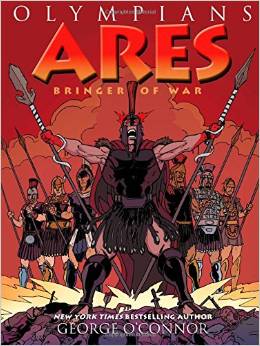
Review: Olympians: Ares: Bringer of War
Ares, the god of war, is the subject of the newest volume in the Olympians series. Continuing from the previous volume Aphrodite, this volume picks up ten years into the Trojan War. Ares’s story is told through this conflict, as the gods draw lines and involve themselves in the human conflict.
Olympians: Ares: Bringer of War
 By George O’Connor
By George O’Connor
All Ages
First Second, January 2015, ISBN: 978-1626720138
80 pgs, $9.99
This seventh volume of the Olympians series takes on the bloodiest of gods in one of the best known conflicts in Greek history. To tell Ares’ story, O’Connor focuses on the Trojan War, where not only are the humans fighting, but so are the gods.
ADVERTISEMENT
ADVERTISEMENT
Ares’ story revolves around his relationships with the other gods. His thinly veiled relationship with Aphrodite earns him his mother’s scorn as she sees him taking after Zeus. Zeus pushes the opposite way, telling him he has too much anger, like his mother Hera. Ares and his sister Athena are like two sides of the same coin: She is strategy and training, he is chaos and mayhem. She appeals to the rational side of war, while Ares appears when all rational thought has been abandoned.
The Trojan War is a human conflict that was sparked by the gods, when Aphrodite promised Paris, a prince of Troy, the most beautiful human woman in the world if he would vote her the most beautiful goddess. The story picks up after ten years of fighting, and it seems the humans have come up with a solution to end it. But animosity still burns in Olympus, and divine intervention keeps the war going. The gods take sides and wage their battle not just through human pawns on the battlefield, but with each other on Olympus. To Ares it doesn’t matter why there is conflict, just as long as there is conflict. His thirst for it is insatiable; he is quick to jump into it and just as quick to flee when he is injured.
While the story is about Ares, it is also about fathers and sons, the gods and their children. Most of the gods have children involved in the battle. Aphrodite and Thetis both have sons on the field and try to intervene on their behalf. In the end, it is fate that decides their final outcomes. Ares and Zeus have children as well, and while both are seen as inattentive fathers, both also react differently to their fates. By the end, Ares reveals the real reason for the war to Zeus in a way that acknowledges and condemns his relationship to his father. It is a revelation that not even the wise Athena could see, but that Ares understands because he was a father as well.
Once again, O’Connor succeeds in showing we don’t know the Greek gods as well as we might think. His tales continue to challenge the reader to seem more than the expected. Ares is more than the god of war and bloodshed. He is truly a passionate god, and the only god to show any emotion to losing a child in the war. The Trojan War has been depicted in many different mediums—books, comics, and films—but rarely is it done from the perspective of the gods. I really enjoyed seeing it from their perspective, since in the end it was about what they, or Zeus, wanted. Olympians continues to be an exceptional series, one that should be on every library and book shelf.
Review copy provided by publisher.
Filed under: All Ages
About Lori Henderson
Lori Henderson is a mother of two teenage daughters and an avid reader. She blogs about manga at her personal blog Manga Xanadu as well as contributing and editing for Manga Village. She blogs about all things fandom (mainly Doctor Who) at her other personal blog Fangirl Xanadu. She's been at it so for over 5 years now and counting!
ADVERTISEMENT
ADVERTISEMENT
SLJ Blog Network
2024 Books from Pura Belpré Winners
In Memorium: The Great Étienne Delessert Passes Away
Parsing Religion in Public Schools
Finding My Own Team Canteen, a cover reveal and guest post by Amalie Jahn
ADVERTISEMENT







